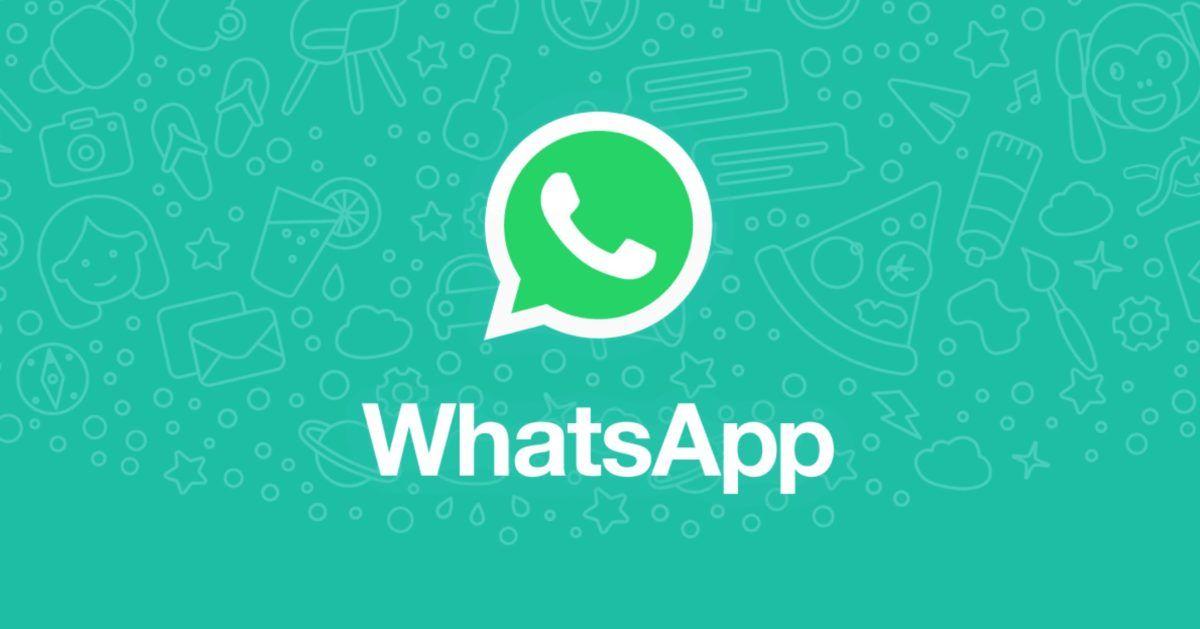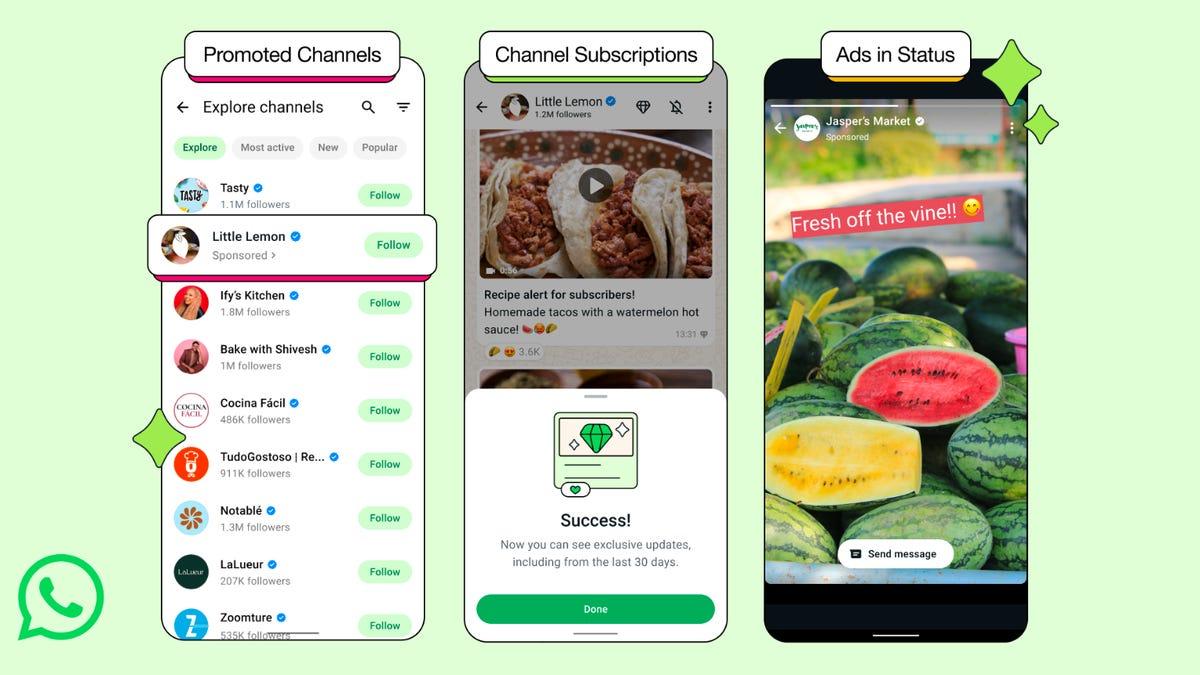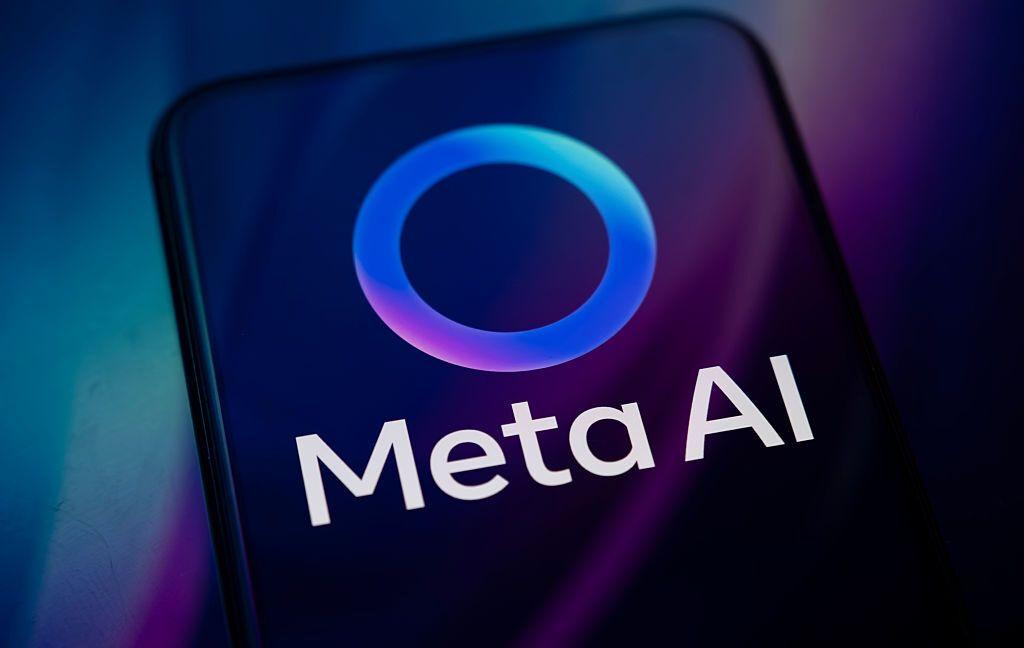Meta Introduces Ads to WhatsApp: A Shift in Privacy and Monetization Strategy
4 Sources
4 Sources
[1]
Meta's AI-Powered Ad Machine Is Coming for WhatsApp Next
Macy has been working for CNET for coming on 2 years. Prior to CNET, Macy received a North Carolina College Media Association award in sports writing. WhatsApp, the Meta-owned messaging app used by close to 2 billion people worldwide, is ramping up its advertising efforts. While the app has long promised a privacy-first experience free from traditional ads, recent updates suggest that's changing, and changing fast. In a blog post published Monday, WhatsApp announced an expansion of its "Channels" discovery and business tools, designed to help you find more content and shops directly within the app. Alongside this rollout, Meta is preparing to introduce more ads, including sponsored content in WhatsApp's Status feature and Channel recommendations. This move builds on the company's broader strategy to monetize WhatsApp without disrupting its core messaging experience. According to reporting by TechCrunch, WhatsApp will soon begin testing ads that appear in the Status tab -- similar to Instagram Stories ads -- and sponsored channel suggestions will start showing up in the Updates tab, where you see Statuses and Channels from friends and creators. "We want to make it easier for people to discover content and businesses they care about on WhatsApp," the company said in its blog post, emphasizing that you'll still control who you follow and what you see. But for many, this signals a shift in WhatsApp's long-standing identity as a clutter-free, private chat platform. Meta did not provide additional information upon CNET's request for comment. The new ad placements will roll out in several key areas: For now, these ads won't interrupt one-on-one encrypted messages, but the expansion of commercial content may still impact how you experience the app. No, not really. There is currently no in-app option to turn off ads on WhatsApp. Since the app doesn't offer a premium or ad-free subscription tier, you will likely have to live with these new ad placements, particularly in Status and Channel discovery sections. However, there are a few workarounds if you want to avoid ads or limit data collection: Read also: Signal, Telegram or WhatsApp: Which Encrypted Messaging App Should You Choose Meta's move to bring more ads into WhatsApp isn't happening in a vacuum; this move is part of a much larger shift across the company's platforms toward AI-powered advertising and monetization. As outlined in CNET's recent reporting, Meta is going all-in on artificial intelligence to power its ad systems. The company is increasingly relying on AI tools to generate and place personalized ad content across Facebook, Instagram and now WhatsApp. This allows advertisers to create more targeted, automated campaigns with less manual input, and allows Meta to rake in more ad revenue with greater efficiency. For Meta, WhatsApp has always been a sleeping giant in terms of monetization. Unlike Instagram and Facebook, which are flooded with ads and algorithmically curated content, WhatsApp has stayed relatively pure, focused on private communication. But that also means it's been underutilized from a business perspective, which is something Meta seems now eager to change. With the introduction of ads in Status, sponsored channels and new business tools, Meta is signaling that WhatsApp will become a more active part of its revenue engine. For now, WhatsApp insists it's trying to balance monetization with user control. But for longtime users, the era of an ad-free experience may soon be a thing of the past. The integration of ads also gives Meta more space to deploy its AI ad technology. The more you engage with Status updates, Channels and shopping features inside WhatsApp, the more signals Meta can feed into its ad systems to refine targeting across its entire app ecosystem. In short, the ads coming to WhatsApp aren't just about making a few bucks from business tools. They're about folding the platform into Meta's larger vision of AI-powered, cross-platform ad dominance. And for you, that means more commercial content surfacing in places that once felt more private.
[2]
Meta Starts Showing Ads on WhatsApp After 6-Year Delay From 2018 Announcement
Meta Platforms on Monday announced that it's bringing advertising to WhatsApp, but emphasized that the ads are "built with privacy in mind." The ads are expected to be displayed on the Updates tab through its Stories-like Status feature, which allows ephemeral sharing of photos, videos, voice notes, and text for 24 hours. These efforts are "rolling out gradually," per the company. The media giant, which acquired WhatsApp for a record $19.3 billion in February 2014, first announced its plans for ads in Status way back in November 2018. Meta also claimed that the ads implementation was developed in the "most privacy-oriented way possible" and that it only uses limited information to serve ads. "Your personal messages, calls, and statuses remain end-to-end encrypted, meaning no one can see or hear them," the company said. "To show ads in Status or Channels you might care about, we'll use limited info like your country or city, language, the Channels you're following, and how you interact with the ads you see." It's worth noting that Meta will use ad preferences from across a user's accounts, including Facebook and Instagram, should they have added WhatsApp to the Accounts Center. Adding WhatsApp to Accounts Center is an optional setting, and is off by default. The exact nature of the information collected includes - Furthermore, Meta said it will neither sell or share users' phone numbers with marketers, nor will it tap into users' personal messages, calls, and groups for ad targeting. "By default, WhatsApp removes or alters personal information (like phone numbers) before sharing it with Meta so that Meta cannot identify individuals and is only able to suggest ads that may appeal to people who share broad characteristics, such as people in the same general area," WhatsApp said. WhatsApp has long been marketed as a more private and secure messaging platform. However, its foray into advertisements could color its reputation as the company tries to balance user features vis-à-vis monetizing the service. The development comes as Meta has added a warning prompt to its Meta AI chatbot app before letting users share their artificial intelligence (AI) prompts to the public Discover feed, following reports of users accidentally sharing chats with sensitive personal information. Privacy and security experts criticized the feature, with the Mozilla Foundation stating that the app does not make it clear that the prompts users share are accessible to anyone across the world. "Prompts you post are public and visible to everyone. Your prompts may be suggested by Meta on other Meta apps. Avoid sharing personal or sensitive information," a message now reads. The change was first reported by Business Insider.
[3]
WhatsApp really is good, so Meta's had enough of that and is now 'monetising the periphery' with new ads that try to make it more like Instagram
WhatsApp has announced that, thanks to having a huge and captive audience, it's getting ready to make the experience just a little bit shitter for everyone. Get ready for three new ad features which are being rolled out globally across the popular messaging app (thanks, BBC). The messaging platform is owned by Meta, and claims to have 1.5 billion global users. The new ads will not appear in peoples' private chats, say WhatsApp, nor will any of your (encrypted) message contents be used to personalise ads. Instead WhatsApp will use the location and language of the user to tailor ads, alongside their follows and what ads they interact with. With one bit of small print: if your WhatsApp is linked to your Facebook or Instagram, then you'll see more personalised ads based on all the data Meta's constantly hoovering up from there. The new ads appear in a section called "Updates", which I've just checked out. It's trying to make me follow an account called "meme land", as well as "Labourer Jobs UK" for some reason. Businesses can pay to promote ads in this section and offer users paid subscriptions, and can also advertise through status updates that resemble Instagram stories and will start an AI chat if clicked on. WhatsApp is, needless to say, creaming off a minimum 10% commission which can increase depending on a given business's size. The only positive of this change, as far as I can see, is that these ads won't be muscling in on the chats and groups, which is the only reason any of us use WhatsApp anyway. Social media commenter Matt Navarra describes it as "monetising the periphery" to the BBC, adding that Meta is "laying the foundation" for monetising WhatsApp at greater scale. Oh goody. The flipside is that no-one really uses WhatsApp for news or feeds or adverts: it's for communication with your mates and family. So whether most users will ever even see these things is up in the air, though we all know Meta can be as annoying as every other big tech company when it really wants to get something in front of your eyeballs. Do you know who does think this is a good thing? Take a bow WhatsApp boss Will Cathcart, who's rubbing his hands with glee at the prospect of further aligning the messaging platform with Facebook and Instagram. "Obviously there's overlap," said Cathcart, stroking a small and hairless white cat (I made that bit up). "We have stories on Instagram and stories on WhatsApp, and we now have a way for businesses to promote themselves in both, and we think that's a good thing." For his part, Navarra thinks this is the beginnings of Meta "trying to to turn WhatsApp into a platform without users realising it, and if they move too fast or it starts to feel like another ad network, people might disengage or, maybe worse, distrust the app." WhatsApp is also pushing this change on users not long after adding Meta's AI tool to the app, which sparked a backlash from users angry they couldn't opt out. Meta's handling of WhatsApp now stands in stark contrast to privacy-focused messaging app Signal, where the leadership has pledged "no AI clutter, and no surveillance ads, whatever the rest of the industry does." I suspect that recent AI backlash may be why these WhatsApp ads are initially hived-off in a side feature of the app, but of course that doesn't mean that's where they're going to live forever. "I want to stress this won't affect your inbox," said Cathcart. "If you're only using WhatsApp for messaging, you're not going to see this." He neglected to add "for now."
[4]
WhatsApp Is No Longer Ad-Free As Meta Rolls Out Business Ads In Status And Promoted Channels, Using Your Location, Language, And App Activity For Personalization
Meta has been actively working on bringing some changes to the company's strategy and approaching AI and other unexplored areas more aggressively. The company has been long dropping subtle hints about bringing ads to WhatsApp, but the years went by in speculation about the update being underway until recently. The tech giant is finally embracing a big change for the platform and moving away from the ad-free model to a new monetization strategy for the platform as what was once was merely speculations is now shaping up to be a reality. Meta recently made a significant announcement about pivoting into a new direction and pushing harder for monetization. The company is starting a new chapter as WhatsApp begins showing ads in status updates from businesses, marking an end to an ad-free era. Previously, the Status feature was used by users to display any voice notes, videos, or images that they wanted to share with their friends and family for a short time as they disappeared after 24 years. But now, along with updates from family and friends, you will also see business ads. The ads from businesses would be marked as sponsored content, so there would be no guesses on where the content is popping up from. This is the first time that Meta took a major step in its monetization strategy for WhatsApp but the idea has been explored for years. Since many of the founders were not in favor of this move, the company's plan to launch in-app ads was dropped in 2020, only in 2023 to be brought up again by WhatsApp chief Will Cathcart, who hinted at the idea still on the table. Meta has advertising as a major revenue stream, as it earned about $160 billion last year alone. The company is now extending the model to WhatsApp, which is significant given that the platform has about 2 billion users. By tapping into this massive audience, the company intends to increase its revenues and also pursue its goal of monetizing its messaging apps. Meta further lets us into the ads that we would be seeing and how they would be personalized to your preferences by gathering up information from a small set of information it has, such as the country you live in, the channels you follow, or even your language setting. The tech giant, however, highlighted that it would not be using any messages, groups, or calls made for the advertisement. In the update, Meta shared: We've been talking about our plans to build a business that does not interrupt your personal chats for years, and we believe the Updates tab is the right place for these new features to work. We will never sell or share your phone numbers to advertisers. WhatsApp would additionally get a new option to subscribe to channels and get exclusive updates from creators or businesses. The Explore button would show promoted channels, demonstrating that the company is making the platform more than a messaging app and pushing for a content-driven platform instead.
Share
Share
Copy Link
Meta is rolling out ads on WhatsApp, marking a significant change in the platform's ad-free model. The company aims to monetize the app while maintaining user privacy, but the move raises concerns about the future of WhatsApp's user experience.
Meta's New Advertising Strategy for WhatsApp
Meta, the parent company of WhatsApp, has announced a significant shift in its approach to monetizing the popular messaging app. After years of maintaining an ad-free environment, WhatsApp is now set to introduce advertisements, marking a pivotal change in its business model
1
.
Source: Wccftech
Ad Placement and User Experience
The new advertising strategy focuses on integrating ads into specific areas of the app without disrupting the core messaging experience:
- Status Updates: Ads will appear in the Status feature, similar to Instagram Stories ads
1
. - Channels: Sponsored channel recommendations will be shown in the Updates tab
1
. - Business Tools: Enhanced discovery and business tools to help users find content and shops within the app
1
.

Source: CNET
Meta emphasizes that these changes will not affect private, encrypted messages between users
2
.Privacy Concerns and Data Usage
WhatsApp claims to be implementing these changes with user privacy in mind:
- Limited information used for ad targeting includes country, city, language, and channel interactions
2
. - Personal messages, calls, and statuses remain end-to-end encrypted
2
. - Meta will not sell or share users' phone numbers with marketers
2
.
However, users who have linked their WhatsApp account to Facebook or Instagram may see more personalized ads based on data from these platforms
3
.Related Stories
AI-Powered Advertising
Meta's move to introduce ads on WhatsApp is part of a broader strategy to leverage AI for advertising across its platforms:
- AI tools will generate and place personalized ad content
1
. - The company aims to create more targeted, automated campaigns with less manual input
1
.
Impact on User Experience and Platform Evolution
The introduction of ads raises concerns about the future of WhatsApp's user experience:
- Some experts view this as "monetizing the periphery" and laying the foundation for larger-scale monetization
3
. - There are worries that WhatsApp may evolve into a content-driven platform, similar to Instagram or Facebook
4
. - The move contrasts with privacy-focused messaging apps like Signal, which pledges to remain free of "AI clutter" and "surveillance ads"
3
.
As WhatsApp begins this new chapter, the balance between monetization and maintaining the app's core appeal as a private, clutter-free messaging platform remains a critical challenge for Meta.
References
Summarized by
Navi
Related Stories
Recent Highlights
1
Elon Musk merges SpaceX with xAI, plans 1 million satellites to power orbital data centers
Business and Economy

2
SpaceX files to launch 1 million satellites as orbital data centers for AI computing power
Technology

3
Google Chrome AI launches Auto Browse agent to handle tedious web tasks autonomously
Technology








